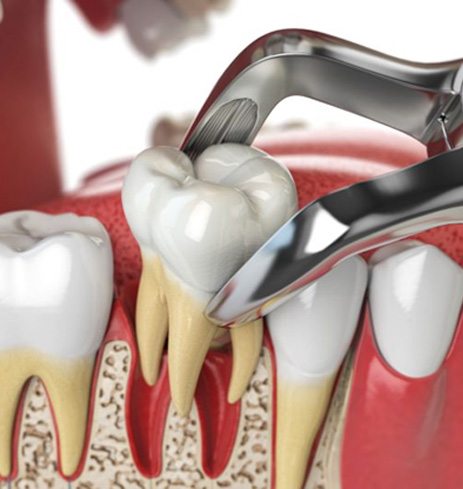Tooth Extractions – Dumfries, VA
Gentle Tooth Removal
Under ideal circumstances, everyone would be able to keep their natural teeth for a lifetime. Unfortunately, some situations can arise that make it necessary for us to perform gentle tooth extractions in Dumfries. If you suspect that one or more of your teeth need to be removed, we are ready to assess the situation and provide compassionate, efficient care at Oral & Facial Surgery Center of Virginia. Get in touch with us to learn more about this important oral surgery service .
Why Choose the Oral & Facial Surgery of Virginia for Tooth Extractions?
- Multiple Types of Sedation Available
- Many Insurance Plans Accepted
- Same-Day Extractions Available
Reasons Why Tooth Extractions Are Necessary

There are a number of reasons why we may determine that it is necessary to remove one or more of your teeth:
- A tooth has severe spots of decay or damage that could not be repaired via more conservative means.
- We need to make room for dental implants, dentures, or orthodontia.
- Tooth removal is important to stop a severe infection from spreading into nearby tissues.
- Advanced gum disease has caused the teeth to loosen.
- Your wisdom teeth are impacted (stuck beneath the gumline) and are posing a threat to your oral health. (Or you wish to remove your wisdom teeth merely as a precaution.)
The Process of Removing a Tooth

During a simple extraction, we use an instrument called an elevator to lift the tooth out of its socket. Then, we use forceps to grip the tooth and gently remove it.
A surgical extraction is more complex. We may need to make incisions in your gums or break a tooth into pieces in order to remove it.
After a tooth is out, we will clean its socket and place some gauze to control bleeding.
Regardless of which type of extraction you undergo, you can be confident that we will do all we can to make sure you are comfortable. We may also encourage you to consider dental implants as a way to replace your lost dentition.
Tooth Extraction Aftercare

Here are some steps you can take to facilitate an easier healing process after your tooth extraction appointment:
- Take all medications as directed by our team.
- After the first 24 hours, regularly rinse your mouth with warm salt water.
- Do not smoke.
- Do not drink through a straw.
- Do not engage in strenuous exercise.
- Get plenty of rest, and prop your head up on pillows when you are sleeping.
- Attend all recommended follow-up appointments with our team, and seek tooth replacement in a timely manner so you can avoid problems like dental drift and further tooth loss.
Understanding the Cost of Tooth Extractions

There are several things we’ll need to discuss with you when recommending a tooth extraction. Naturally, one of the most important things on that list is how much you will likely end up paying for the procedure. Like with many treatments, the cost of tooth extractions can vary depending on your circumstances. Below is a basic overview of the factors involved and your financial options; please let our team know if you have any more questions about how to make sure that the tooth extraction process fits into your budget.
Factors That Can Affect Tooth Extraction Cost

The tooth extraction process will need to be personalized depending on your needs, which is why the cost isn’t set in stone. The final price will depend on:
- The Number of Teeth Involved: If you need to have more than one tooth removed, you will likely end up paying more than you would if only a single tooth had to be extracted.
- The Location of the Tooth: It typically costs more to extract a tooth near the back of the mouth since they’re harder to work on than your front teeth.
- The Complexity of the Extraction: A fully erupted tooth can often be removed with a simple extraction. Meanwhile, an impacted or badly damaged tooth might require a surgical extraction that carries a higher price tag.
- Your Chosen Tooth-Replacement Method: Once your tooth has been removed, you need to decide what to do about the gap. Dental implants usually cost more than traditional dentures and bridges, but they also have longer lifespans and can stop your jawbone from degenerating.
Does Dental Insurance Cover Tooth Extractions?

When committing to any sort of procedure involving your teeth, it’s always a good idea to double-check whether it’s covered by your dental insurance. You can usually expect tooth extractions to be covered, but the exact amount that your insurance company pays depends on what plan you have. On top of that, you may have to take waiting periods, a deductible, and your annual maximum into account.
Our team regularly works with many dental insurance plans, so if there’s anything you don’t understand, we can take a quick look at your benefits and clarify the details.
How to Make Tooth Extractions Affordable

Many patients don’t have dental insurance plans. Others do but find that their benefits don’t adequately cover the specific procedure they need. In these types of situations, it may be worth considering a third-party financing plan.
At our practice, we’re willing to accept financing plans from CareCredit and LendingClub. Both companies will allow you to pay for your care in a series of monthly installments, which can take much of the stress out of the financial aspect of the process. Many of the plans you can choose from have low or even no interest. Reach out to our office today if you have any questions regarding your financing options.
Tooth Extractions FAQs
Does Getting a Tooth Extracted Hurt?
Whether seeking preventive care or cosmetic treatment, many patients are hesitant to commit to treatment due to fear of pain. The good news is that whether you are having a single tooth pulled or several of them, our first step is always going to be numbing your mouth with a local anesthetic. Some soreness is normal following the procedure. Just be sure to carefully follow your aftercare instructions. If your discomfort worsens or you begin showing signs of infection, don’t hesitate to contact us.
Can I Leave the Space Empty After a Tooth Extraction?
If the tooth that is being pulled is toward the back of the mouth, many patients may think that they don’t need to have it replaced. After all, if no one can see it, why worry about it? The truth is that all of your teeth are essential when it comes to proper chewing and enunciating clearly. Even a single missing back tooth can make it difficult to eat your food, leading to poor nutrition and indigestion. It is recommended that when you are done healing, you schedule an appointment with your dentist to find a tooth replacement option that is ideal for you.
How Long After a Tooth Extraction Can I Get Dentures?
It usually takes about six to eight weeks to get dentures. Once you have completely healed, your dentists will take impressions of your mouth that will be used to craft your restoration. During this time they will also make note of the ideal size, shape, and shade of your replacement teeth. Once created, your dentist will have you test them out and make any final adjustments if needed.
What Risks Are Involved with Tooth Extractions?
Fortunately, tooth extractions are considered to be extremely safe. That being said, any dental procedure comes with risks. The primary one is infection. Dry socket is another risk, which can be painful and delay the recovery process significantly. To keep this from happening, your dentist will provide you with a list of aftercare instructions, as well as common symptoms of infection to keep an eye out for.
Is There an Alternative to a Tooth Extraction?
This depends on why Dr. Shinwari is recommending your tooth be extracted. If it is due to decay or damage, most likely it cannot be saved, and extraction is your best option. For other options such as orthodontic treatment, there may be alternatives that you can discuss with your dentist.
The good news is that there are many tooth replacement options available, such as dental implants, bridges, dentures, and implant dentures. Speak to Dr. Shinwari about which options will work best for you.
What’s the Recovery for Tooth Extractions Like?
Recovering from tooth extraction should take a few days, but following your aftercare instructions is essential. First, it is important that you get plenty of rest. This will help the healing process along.
Additionally, you should also be cautious about your extraction site. Caring for the blood clot that forms in the socket where your tooth was is essential to recovery. Failure to do so could cause a painful condition called dry socket. To avoid this, do not use a straw for at least a week after your extraction, and do not spit for several days following the procedure.
Furthermore, keep your mouth clean. This will lower your risk of infection. You can rinse with salt and warm water and brush your teeth within about three days after your procedure as long as Dr. Shinwari says its safe to do so.
Other ways to ensure proper healing is to stick to a diet of soft foods, change your gauze as necessary, do not smoke, apply cold compresses, and take your OTC or prescription pain medication as directed.
You should begin to feel much better around the three-to-four-day mark.
What Should I Do After My Tooth Extraction?
After your tooth extraction, you should go home and get some rest. This will help you heal faster. Do not partake in any strenuous activities such as exercising for at least 24 hours.
To prevent dry socket, be sure to keep your gauze pad in place as directed, stay hydrated, and do not under any circumstances use a straw or spit.
To care for the wound, do not touch it with your tongue or fingers, and do not pull at any stitches or sutures. These will dissolve on their own and must not be pulled out. If you have any pain, you can apply a cold compress to the area to reduce swelling and numb the area. You can also take an OTC or prescribed pain reliever as instructed by Dr. Shinwari.
What’s the Difference Between Tooth Extractions and Wisdom Tooth Surgery?
While they may seem the same, wisdom tooth extraction is different than regular tooth extraction. Wisdom tooth extraction is designed to remove your third and final set of molars, while tooth extraction can be done on any tooth that is either irreparably damaged or causing crowding issues. Furthermore, wisdom tooth extractions are often considered surgical procedures because they may be removing an impacted tooth that is below the gumline.

